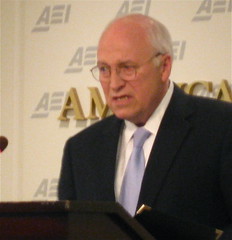Introducing The New Nuclear Pandemic
Americans should be more concerned by the proliferation of nuclear weapons from North Korea to other states or non-state actors, rather than focus on a direct N.Korean nuclear attack on the Western World.
Such was the conclusion of former Secretary of Defense William Perry when addressing the Council on Foreign Relations (CFR) on U.S nuclear weapons policy today.
“When we are concerned about proliferation, for example from N.Korea to Iran, we are concerned with the possibility that nuclear terrorists might be a bomb... The greater danger is that the bomb or the fissile material leak from one of these countries.” said Perry.
On Monday, N.Korea announced that it had successfully detonated and underground nuclear bomb, and on Tuesday, it launched two short-range ballistic missiles. As a result, the Obama administration may be facing an unexpected turn in the nuclear debate.
The topic is gaining momentum as talks between the U.S and Russia on the renewal of the 1991 Strategic Arms Reduction Treaty (Start) are feared to be unsuccessful.
That N.Korea has nuclear capabilities and is testing missiles has fanned the flames on the necessity to reconsider the reduction in the Department of Defense FY2010 budget.
Perry was joined by Brent Scowcroft, former assistant to the President for National Security Affairs who explained that “a great danger in nuclear terrorism lies with the civilian nuclear power and the loose fissile material that comes with that.”
Scowcroft appealed to the security dilemma to provide a link between N.Korea or Iran acquiring a nuclear power and nuclear terrorism.
“If we don’t put a cap on proliferation now, we could easily face 30 or 40 countries with that capability, That is not a better world,” said Scowcroft, adding that “If [Iran and N.Korea] are free to enrich uranium to weapons grade, then you have others who want to do it just for protection or whatever and then you have a tremendous danger of terrorists getting hold of fissile material and then its relatively easy.”
The U.S government had already started to deal with this problem under the Bush junior administration, as Perry explains: “For one thing I support the initiative of the previous administration called the Proliferation Security initiative (PSI) and the recent moves to strengthen this initiative.”
Former President George.W. Bush said that PSI’s aim is "to keep the world's most destructive weapons away from our shores and out of the hands of our common enemies."
The initiative is limited to controlling alien ships in one’s waters to search for weapons. Airways are however not part of the PSI.
 1991,
1991,  Council on Foreign Affairs,
Council on Foreign Affairs,  DOD budget,
DOD budget,  Iran,
Iran,  North Korea,
North Korea,  Russia,
Russia,  START,
START,  Strategic Arms Reduction Treaty,
Strategic Arms Reduction Treaty,  Us,
Us,  William Perry,
William Perry,  ballistic,
ballistic,  bomb,
bomb,  brent scowcroft,
brent scowcroft,  civilian,
civilian,  debate,
debate,  fissile material,
fissile material,  fy2010,
fy2010,  george w bush,
george w bush,  nuclear missiles,
nuclear missiles,  nuclear weapons policy,
nuclear weapons policy,  president,
president,  secretary of defense,
secretary of defense,  terrorists,
terrorists,  underground,
underground,  western world in
western world in  Congress,
Congress,  Frontpage 1,
Frontpage 1,  News/Commentary
News/Commentary 




Pelosi: Democrats Stand By The IMF
Despite the uncertainties that Congressional Republican leaders have on the efficacy of the reform of the International Monetary Fund, House Speaker Nancy Pelosi is adamant that “The IMF will have a strong support from the Democrats.”
Pelosi defended the international organization today at her weekly press conference where she also mentioned the success of her recent bipartisan trip to China.
House Minority Leader John Boehner and Senate Minority Whip Eric Cantormay, backed by other House Representatives who fear that Democrats are fusing two very different entities, the IMF and a bill, together, said that "Weighing down this critical legislation with non-defense spending will only drag this process out further and cost it essential Republican support needed for passage."
Cantor added that “We should not be having this discussion. IMF funding has no business being included in the war supplemental bill,” while adding that the funding may result in helping terror-sponsoring states such as Pakistan.
The debate over funding of the IMF has stemmed from President Barack Obama’s announcement at the April Group of 20 meeting that $100 billion will be granted to the IMF as part of the U.S war-bill which should further the fight against the global economic crisis.
Obama also said that the U.S would support the IMF as it sell 400 tons of gold, whilst Pelosi reminded that “It [the IMF] has been reformed so that it will help the poor. They wanted to sell gold, we said you can, but the proceeds have to go to help the poor.”
Responding to Cantor’s allegations, Pelosi said “I don’t know why anyone would say that the money is going to the hands of terrorists, it’s simply not based on facts and is a scare tactic.”
Pelosi also said “There are two contradictory things: one says that one shouldn’t be on war funding, which is our responsibility to support our troops in the war in Iraq, end the war in Iraq, bring our troops home and fight terrorism where is it a threat to our country, which is in Afghanistan, and we know that we have to do that." She added that “The IMF, in its reformed state, can be a force for alleviating the despair amongst people in the world. It’s a very important national security initiative.”
“The issue of the IMF, I think, has strong support on the Democrats’ side; not any support we’re hearing on the Republican side,” Pelosi said.
This war-bill, which involves military and diplomacy costs for Iraq and Afghanistan, will skyrocket to over $100 billion.